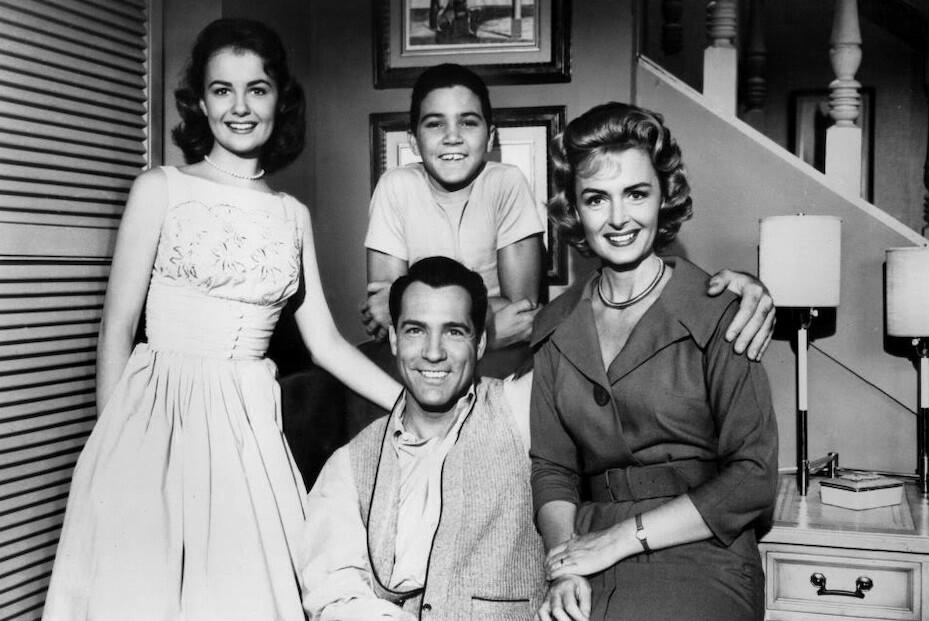
March 26, 2021
What would Donna Reed do?
Share this story
Donna Reed could be seen as a disrupter in the 1950s and 60s. The actress, who starred in “It’s a Wonderful Life “and “From Here to Eternity,” was looking for a role that differed from the “goody, goody girl roles” she had been pigeonholed into early in her career.
“She decided to do a family show after she and her husband, Tony Owen, formed a production company,” said Annie Newton, a Virginia Commonwealth University graduate who wrote her master’s thesis on Reed.
That thesis, “Mother Knows Best: The Donna Reed Show, the Feminine Mystique and the Rise of the Modern Maternal Feminist Movement,” won Newton the VCU Graduate School’s outstanding thesis award in the fine arts category in 2018. Newton, who received her master’s degree in history from the College of Humanities and Sciences and is currently the programming coordinator at The Alliance for Historic Hillsborough, discussed her thesis during a webinar Thursday moderated by Emilie Raymond, a professor in the Department of History who specializes in 20th century American political culture.
When “The Donna Reed Show” began airing in 1958, Reed was only the second woman to star in and produce a television show. The first was Lucille Ball in “I Love Lucy.”
“Donna was the producer of her show and she is not credited. It was just her husband’s name on the credits, but she had full control of the script,” Newton said. “She had control of the story and where the show was going.”
In doing her research, Newton watched over 100 episodes of “The Donna Reed Show.” What she discovered surprised her. “My mind was blown,” she said.
“‘The Donna Reed Show’ was falsely linked to other family sitcoms like ‘The Adventures of Ozzie and Harriet,’ ‘Father Knows Best’ and ‘Leave it to Beaver’ that were conformist,” she said. “If you look at these shows, they are all about the dad. The father is the center of the storyline.”
But in Reed’s show, her character, Donna Stone, was the center of the story.
“It was completely different,” Newton said. “In the 1950s there were rigid gender roles.”
There were also deep anxieties post-World War II and over the emerging Cold War between the United States and Soviet Union. Men were afraid of a strong female character with control, Newton said.
“Shows had bland plot lines. They were doing that on purpose because of worries about the Cold War, nuclear bombs and the Soviet Union. [The message from show producers was that] it’s ok to escape into television,” she said.
Breaking down barriers
In her show Reed stepped outside her own gender role, sometimes into a traditional male role when parenting.
“She pushed boundaries that no one else did at that time,” Newton said. “She is pushing racial barriers as well, doing subtle things that make it stand out.”
For example, in one of the show’s episodes one of Donna Stone's husband’s friends was married to a Japanese woman. Donna and her friends saw that the woman was too subservient to her husband.
“They sit her down and Americanized the woman. She goes on to tell her husband no and he can’t believe it,” Newton said. While the episode somewhat played into cultural stereotypes, it also showed Reed's concern about equality in marriage and push to have minority actors on the show, Raymond said.
Reed’s show foreshadowed much of the discontent illustrated by Betty Friedan’s “The Feminine Mystique,” published in 1963, Newton said. The show explored Donna Stone’s frustrations with housework, her desire to be involved in professional activities outside the home and her determination to be equal in her marriage. She challenged conventional norms, Newton said, much as Friedan did in her book, which also talks about the conformity of middle class women in the 1950s. But Reed’s show also differs from Friedan’s book in an important way, Newton said Thursday.
“Donna’s show mentions women not being fulfilled, not having identity,” Newton said. “She pushes back on those stereotypes. Her show is about finding herself in addition to being a mother. She pursues things like writing a novel or starting her own business while also finding fulfillment in her role as a mother, which is totally against what Betty Friedan says.”
This difference, Newton said, is that “The Donna Reed Show” represents maternal feminism, which is different from the feminism Friedan advocates for in “The Feminine Mystique.”
“Maternal feminism is the idea that women are empowered to challenge gender norms while fulfilling themselves,” Newton said. “On the show it’s more of this fulfillment of motherhood while still pushing for equality. Maternal feminism is not political.”
The issue of gender equality that played out in the show, which ran until 1966, continues to be a hot topic today, Newton said.
“We are still having these conversations,” she said. “Donna Reed believed that women can be whatever they want to be. Why are we still having these conversations about women not being able to do what they want to do?”
The show was the forerunner of shows such as “The Mary Tyler Moore Show,” “That Girl” and “Julia” where women were breaking down barriers.
“It paved the way for a female-oriented show,” Newton said.
Subscribe to VCU News
Subscribe to VCU News at newsletter.vcu.edu and receive a selection of stories, videos, photos, news clips and event listings in your inbox.







